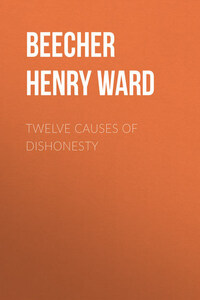TWELVE CAUSES OF DISHONESTY
Only extraordinary circumstances can give the appearance of dishonesty to an honest man. Usually, not to seem honest, is not to be so. The quality must not be doubtful like twilight, lingering between night and day and taking hues from both; it must be day-light, clear, and effulgent. This is the doctrine of the Bible: Providing for honest things, not only in the sight of the Lord, but also in the sight of men. In general it may be said that no one has honesty without dross, until he has honesty without suspicion.
We are passing through times upon which the seeds of dishonesty have been sown broadcast, and they have brought forth a hundred-fold. These times will pass away; but like ones will come again. As physicians study the causes and record the phenomena of plagues and pestilences, to draw from them an antidote against their recurrence, so should we leave to another generation a history of moral plagues, as the best antidote to their recurring malignity.
Upon a land, – capacious beyond measure, whose prodigal soil rewards labor with an unharvestable abundance of exuberant fruits, occupied by a people signalized by enterprise and industry – there came a summer of prosperity which lingered so long and shone so brightly, that men forgot that winter could ever come. Each day grew brighter. No reins were put upon the imagination. Its dreams passed for realities. Even sober men, touched with wildness, seemed to expect a realization of oriental tales. Upon this bright day came sudden frosts, storms, and blight. Men awoke from gorgeous dreams in the midst of desolation. The harvests of years were swept away in a day. The strongest firms were rent as easily as the oak by lightning. Speculating companies were dispersed as seared leaves from a tree in autumn. Merchants were ruined by thousands; clerks turned adrift by ten thousands. Mechanics were left in idleness. Farmers sighed over flocks and wheat as useless as the stones and dirt. The wide sea of commerce was stagnant; upon the realm of Industry settled down a sullen lethargy.
Out of this reverse swarmed an unnumbered host of dishonest men, like vermin from a carcass. Banks were exploded, – or robbed, – or fleeced by astounding forgeries. Mighty companies, without cohesion, went to pieces, and hordes of wretches snatched up every bale that came ashore. Cities were ransacked by troops of villains. The unparalleled frauds, which sprung like mines on every hand, set every man to trembling lest the next explosion should be under his own feet. Fidelity seemed to have forsaken men. Many that had earned a reputation for sterling honesty were cast so suddenly headlong into wickedness, that man shrank from man. Suspicion overgrew confidence, and the heart bristled with the nettles and thorns of fear and jealousy. Then had almost come to pass the divine delineation of ancient wickedness: The good man is perished out of the earth: and there is none upright among men: they all lie in wait for blood; they hunt every man his brother with a net. That they may do evil with both hands earnestly, the prince and the judge ask for a reward: and the great man uttereth his mischievous desire; so they wrap it up. The best of them is a brier; the most upright is sharper than a thorn hedge. The world looked upon a continent of inexhaustible fertility, (whose harvest had glutted the markets, and rotted in disuse,) filled with lamentation, and its inhabitants wandering like bereaved citizens among the ruins of an earthquake, mourning for children, for houses crushed, and property buried forever.
That no measure might be put to the calamity, the Church of God, which rises a stately tower of refuge to desponding men, seemed now to have lost its power of protection. When the solemn voice of Religion should have gone over the land, as the call of God to guilty man to seek in him their strength; in this time when Religion should have restored sight to the blind, made the lame to walk, and bound up the broken-hearted, she was herself mourning in sackcloth. Out of her courts came the noise of warring sects; some contending against others with bitter warfare; and some, possessed of a demon, wallowed upon the ground foaming and rending themselves. In a time of panic, and disaster, and distress, and crime, the fountain which should have been for the healing of men, cast up its sediments, and gave out a bitter stream of pollution.
In every age, an universal pestilence has hushed the clamor of contention, and cooled the heats of parties; but the greatness of our national calamity seemed only to enkindle the fury of political parties. Contentions never ran with such deep streams and impetuous currents, as amidst the ruin of our industry and prosperity. States were greater debtors to foreign nations, than their citizens were to each other. Both states and citizens shrunk back from their debts, and yet more dishonestly from the taxes necessary to discharge them. The General Government did not escape, but lay becalmed, or pursued its course, like a ship, at every furlong touching the rocks, or beating against the sands. The Capitol trembled with the first waves of a question which is yet to shake the whole land. New questions of exciting qualities perplexed the realm of legislation, and of morals. To all this must be added a manifest decline of family government; an increase of the ratio of popular ignorance; a decrease of reverence for law, and an effeminate administration of it. Popular tumults have been as frequent as freshets in our rivers; and like them, have swept over the land with desolation, and left their filthy slime in the highest places: – upon the press; – upon the legislature; – in the halls of our courts; – and even upon the sacred bench of Justice. If unsettled times foster dishonesty, it should have flourished among us. And it has.








